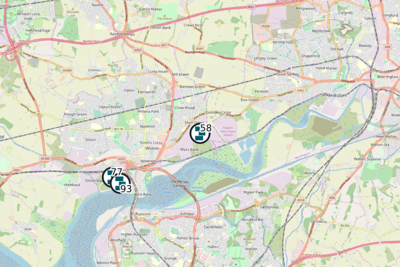Markley Group Biomass: Difference between revisions
m minor typo |
m minor text changes |
||
| Line 5: | Line 5: | ||
==Summary== | ==Summary== | ||
A [[Biomass EFW]] located at [[ | A [[Biomass EFW]] located at [[Markley Group]] premises in Hardwicke, Gloucestershire, which generates 2.1MW from c. 2,300 tonnes of [[Wood Waste]] from its commercial business<ref name="BIO">[https://www.bioenergy-news.com/news/markey-group-opens-1-1m-biomass-facility/ Bioenergy News]</ref>. | ||
In 2012, Gloucester based | In 2012, Gloucester based Markley Group opened a £1.1m biomass facility which runs on waste wood generated by the subsidiary of Markley Group, [[Premiere Kitchens]]<ref name="BIO" />. Each year Premiere Kitchens creates approximately 2,350 tonnes of waste wood in the form of extracted chipboard dust and residual off-cuts, which is used in the plant to generate all of the heating and hot water required for the company's site at Hardwicke<ref name="BIO" />. | ||
Following the installation of the biomass facility, | Following the installation of the biomass facility, Markley Group were able to remove its mains gas supply and as a result the company reduces its carbon emissions by more than c.1,200 tonnes per year<ref name="BIO" />. | ||
==Plant== | ==Plant== | ||
Revision as of 12:55, 28 April 2020
| Error: no local variable "site" has been set. Error: no local variable "status" has been set. | |
 See Biomass EfW → page for a larger UK Wide map. | |
| Operator | Error: no local variable "operator" has been set. |
| Capacity | Error: no local variable "capacity" has been set. MWe |
| Feedstock | Error: no local variable "mainfeed" has been set. |
| EPR (Waste Licence) | Error: no local variable "epr" has been set. |
| ROC | Error: no local variable "roc" has been set. |
| CfD | Error: no local variable "cfdcap" has been set. |
| CHP | Error: no local variable "chp" has been set. |
Operators Annual Report
Input Data
| Year | Wood | Litter | RDF | Other | Total |
|---|
Output Data
| Year | IBA | IBA %ge of Tot IN | APC | APC %ge of Tot IN |
|---|

Summary
A Biomass EFW located at Markley Group premises in Hardwicke, Gloucestershire, which generates 2.1MW from c. 2,300 tonnes of Wood Waste from its commercial business[1].
In 2012, Gloucester based Markley Group opened a £1.1m biomass facility which runs on waste wood generated by the subsidiary of Markley Group, Premiere Kitchens[1]. Each year Premiere Kitchens creates approximately 2,350 tonnes of waste wood in the form of extracted chipboard dust and residual off-cuts, which is used in the plant to generate all of the heating and hot water required for the company's site at Hardwicke[1].
Following the installation of the biomass facility, Markley Group were able to remove its mains gas supply and as a result the company reduces its carbon emissions by more than c.1,200 tonnes per year[1].
Plant
The plant was commissioned by UK-based Indusvent Limited who were instructed to design, supply and install a complete turnkey project which included a dust extraction and filtration system for production machinery, a sealed chipboard dust and chips transportation system, a 300m3 storage silo with hydraulic moving floor discharge, shredding of off-cuts and burning of the collected material to provide hot water and heating for both the office and factory heating[2]. The system features a 2.1 MW hot water boiler manufactured by Danish based Justsen Energiteknik A/S[1]. The burning of the Wood Waste in the boiler is controlled automatically to maximise efficiency with results monitored both on site and at the manufacturers premises in Denmark[1].
Tonnage Input/Fuel
The tonnage received by the plant is a mixture of Wood Waste off-cuts from its kitchen construction business and is essentially 'internal' material that is neither reported in the most recent Annual Sustainability Report for 2018-19[3] by Ofgem or the EA data for the calendar year (i.e. January 2018 to December 2018).
